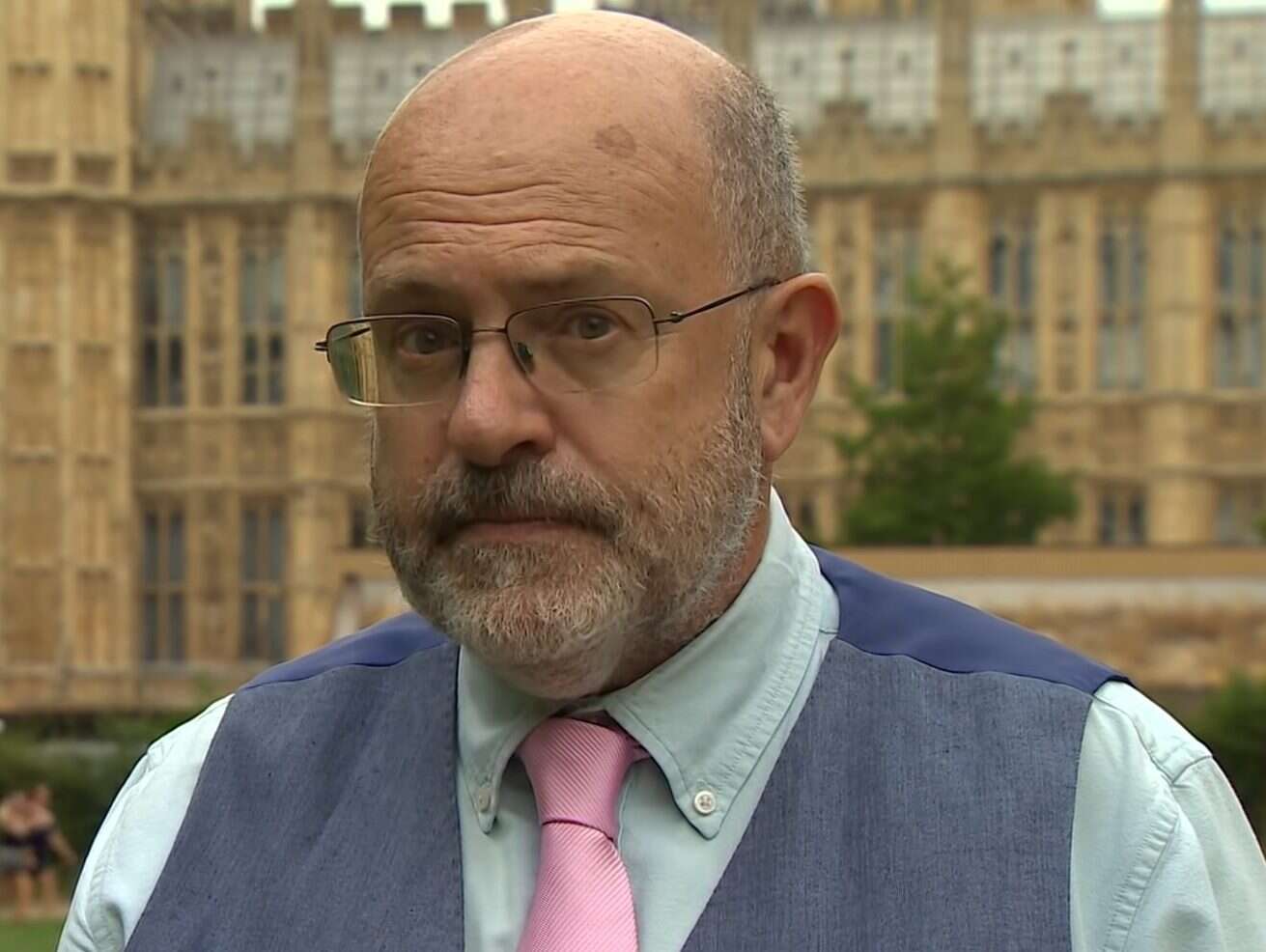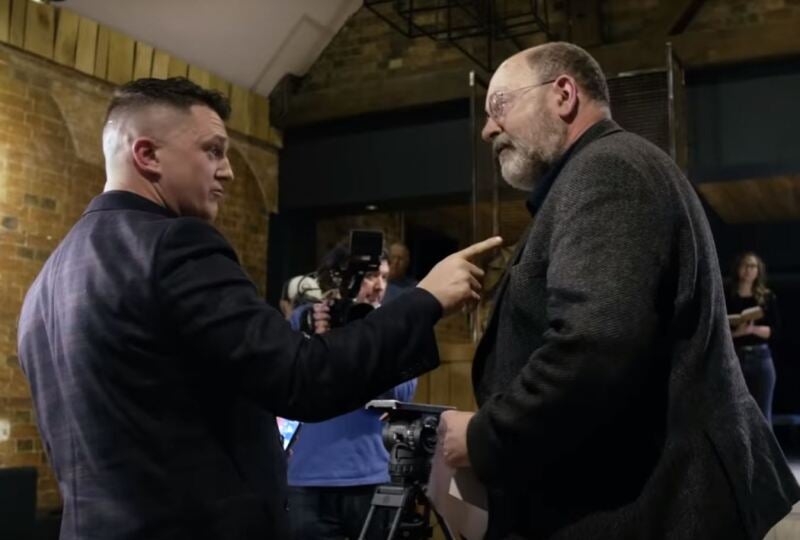
Ex-BBC journalist John Sweeney has said the broadcaster’s failure to run his Panorama report on Tommy Robinson, alongside abuse from the right-wing activist’s supporters, led him to seek psychiatric help.
The former Newsnight and Panorama reporter told Press Gazette he “cracked up” as a result of the stress of the situation and saw two psychiatrists, saying he “stopped being myself”.
Sweeney, who has reported from conflict zones, gone undercover in North Korea and faced off against Scientology, said it was the “worst thing I’ve ever had to endure” and described it as a “desperate experience”.
He left the BBC in October after 17 years, having faced repeated attempts to make him redundant.
Sweeney said he “came to an agreement” with the corporation over his departure, but refused to directly address claims in a Buzzfeed report that he left after an HR complaint was made against him by a young journalist.
The former Observer journalist has since blown the whistle on the BBC and called on Ofcom to investigate BBC News’ failure to broadcast a number of reports on the “far-right, Russia and Brexit”.
BBC boss Tony Hall ‘should go’
He has also criticised the corporation for what he described as a “culture of timidity”, the blame for which he puts at the feet of director general Tony Hall, who he called on to step down.
Sweeney’s report on Robinson has still not been broadcast.
It was hijacked after a supporter of the English Defence League co-founder secretly filmed the reporter during their meeting. The footage showed him ordering a number of alcoholic drinks and making comments the BBC was later forced to apologise for.
Robinson used the footage to turn on Sweeney during a pre-arranged interview for Panorama and broadcast the encounter, along with a mass protest outside the BBC’s offices in Manchester, on Youtube in February.
Sweeney, 61, said putting out the Panorama film would have been “the answer to these charges that were put against me”.

Tommy Robinson and John Sweeney exchange words during filming for Panorama. Picture: Youtube
He said supporters of Robinson, real name Stephen Yaxley-Lennon, had harassed him on the street, including at the funeral of journalist Lyra McKee who was shot dead in April while reporting on rioting in Derry.
He said it had been a “horrible experience” but added: “[When] you’re being intimidated by somebody like Tommy Robinson… the response is to stand up and put the film out.
“And if that meant showing that I had made a bit of a fool of myself – I drank too much with a source who secretly filmed me – that’s okay, because I think viewers are sophisticated enough to understand what I was doing.
“Every single newspaper reporter who reads Press Gazette will realise what I was doing, which is I was trying to get a source to give Panorama an interview – and I can’t pay that source any money because that’s against the rules, but I can wine and dine, put on a show.”
He said the show should have been put out by March but the BBC “kept on delaying it”. He claimed Robinson had “ended up intimidating BBC Panorama” and that this was “not good”.
BBC ‘did not have my back’
He told Press Gazette: “I cracked up because they didn’t put the programme out, because I was getting all this abuse online and in person – six different people challenged me on the street – and it was incredibly difficult.
“And the problem was the two things. It was being attacked by Tommy Robinson supporters, online and in person, including at the funeral of my friend, and at the same time the BBC not putting the programme out, which was the answer to these charges that were being put against me, and so not being able to defend myself.
“So the two pressures together [were] the worst thing I’ve ever had to endure. I’ve been to war zones but I knew people had my back. This was weird and that led me to crack up and as a result I ended up leaving.”
He said the BBC “did not have my back” and that he felt “bewildered and betrayed” by its decision not to run the Robinson film.
“They should have put the programme out,” he said.
“[Ex-BBC director general] Mark Thompson would have done it. He put out Scientology. Difficult as it was Scientology attacked and then when we put out our film – everybody could see it.
“I’m not a classic BBC stuffed shirt, I’m a frontline soldier and all of that gets messy, you get shot at. People get that, people understand the kind of reporter I was.
“I think it would have been difficult for me, but I was willing to take and accept the embarrassing footage which was always in the [Tommy Robinson] film. So we should have put it out. But if the person running the BBC is timid, that’s a major problem.”
Sweeney made headlines when he shouted at Scientology spokesperson Tommy Davis during a 2007 Panorama special, having been targeted by the church over his investigation into it.
He later apologised, saying he was “wrong to lose it”. Sweeney did a follow-up programme on Scientology for Panorama in 2010 in which a former handler for the church admitted hiring people to follow him.
Turning fire on Lord Hall he told Press Gazette the BBC’s boss and the corporation itself had become “browbeaten by social media”.
“They’re so exhausted, morally and spiritually, just in terms of energy, that they’ve ended up avoiding trouble,” he said. “And someone like me generates extra trouble. It’s good trouble.”
Writing Daphne book ‘helped put me back together again’
A BBC spokesperson said: “The BBC demands high standards from its journalists and expects them to behave with the necessary professionalism.
“As John knows, failing to do so compromises investigative journalism. Furthermore, investigative journalism can take years.
“The fact something has not yet been broadcast does not mean an investigation has finished.”
Sweeney said leaving the country helped take the pressure off him. After accepting the film would not air, he went to Malta and co-authored a book on the assassination of investigative journalist Daphne Caruana Galizia, a story he had previously covered for Newsnight.
“The thing that put me back together again was the discipline of helping to write the book on Daphne Caruana Galizia,” he said
Sweeney co-authored Murder on the Malta Express: Who killed Daphne Caruana Galizia? with Carlo Bonini and Manuel Delia. The book was published by Silvertail Books last month.
“To follow in her footsteps was exhilarating, but also [it was] just the simple thing of here’s a job John, sit and work through [it]…”
He added: “What it meant was that while I was effectively sorting my life out I had something to do, which was help write this book.”
The book was written with a grant from the Justice for Journalism fund and initially struggled to find a British or US publisher – “now it’d be bloody easy, but then it was difficult,” said Sweeney.
He has also written a novel, The Useful Idiot – “which is not an autobiography” – also published by Silvertail and due out in January.
Climate for journalists ‘more frightening than ever’
On the subject of journalists’ safety, which has become a area of growing concern even as press freedom groups reported a record low for journalist deaths this year, Sweeney said it is “the most scary it’s ever been”.
He said when Washington Post columnist Jamal Khashoggi was killed in a Saudi Arabian embassy in Istanbul, Turkey, on 2 October 2017, he “felt afraid for the first time”.
“I said to myself, you’ve gotta watch it John because of this,” Sweeney said.
“In Russia my friends get murdered… but what’s happening is that Trump’s poison, this contempt for what we do, this talk of fake news, this is a major problem and it’s enhanced and fuelled by lawlessness online.
“It feels like Trump has created this toxic atmosphere in which people, journalists, can get killed. That’s why it’s so alarming if you’re own organisation doesn’t defend you.
“The climate is more frightening than it’s ever been my entire life. I understand when I went to Yugolsavia, to Bosnia or Iraq, it was dangerous, but now it’s dangerous on the streets of London.
“That’s the new thing and that’s scary.”
Email pged@pressgazette.co.uk to point out mistakes, provide story tips or send in a letter for publication on our "Letters Page" blog
